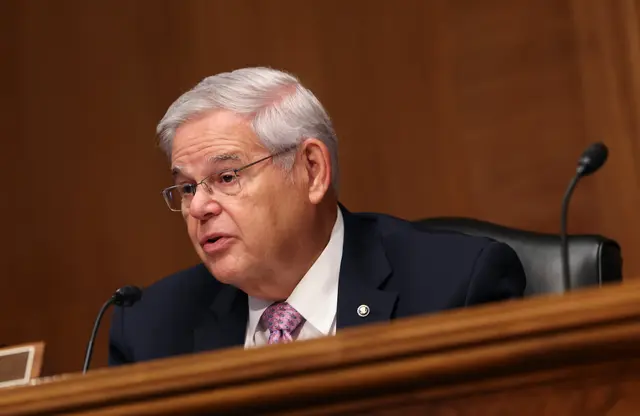Menendez Indicted Again: American Politics, the Corrupt Road to Riches

by Roger L. Simon
I’m almost embarrassed to quote journalist H. L. Mencken’s famous remark once again: “When somebody says it’s not about the money, it’s about the money.”
Mr. Menendez and his wife, Nadine Menendez, have both been indicted on bribery charges in connection with their “corrupt relationship with three New Jersey associates and businessmen,” the U.S. Attorney’s Office for the Southern District of New York wrote in the indictment. “The bribes included cash, gold, and payments toward a home mortgage, compensation for a low-or-no-show job, a luxury vehicle, and other things of value.”
Indeed, corruption is so common in our political culture that the public has become so inured to it that the likes of Mr. Menendez get elected over and over.
Politics in the United States has become the royal road to riches, and hardly anybody seems to care.
Witness the fortunes amassed while in office by President Joe Biden, former Speaker Nancy Pelosi (D-Calif.) and Sen. Dianne Feinstein (D-Calif.), either directly or through and/or to family members. Republican politicians aren’t exactly poor either. Rep. Darrell Issa (R-Calif.) is supposedly good for $115.9 million; Sen. Rick Scott (R-Fla.) for a cool $200.5 million.
I have never met a successful politician who remained impecunious for long.
Apropos, as I was writing this, the new book by Breitbart’s Alex Marlow arrived at my door: “Breaking Biden: Exposing the Hidden Forces and Secret Money Machine Behind Joe Biden, His Family, and His Administration.”
Money machine indeed. Thumbing through, the book looks well-researched with a plethora of footnotes, as such a work should be. I intend to read it soon, despite thinking I knew what there is to know about the many Biden family malfeances (maybe I don’t).
The salient question that arises is why American politics has become so infected with money most politicians almost naturally become greedy themselves, sometimes to incredibly excessive amounts.
One reason is that almost all of them, whether poor or rich themselves, spend the bulk of their time around wealthy people importuning them for money. Agreements, spoken and unspoken, flow like water.
This happens from the moment they enter the profession and never stops. We have, after all, endless campaigns.
There is never enough money, even for politicians and candidates who seemingly can self-finance and are therefore less prey to corruption like former President Donald Trump or candidate Vivek Ramaswamy.
Yet they, like virtually all other politicians, are constantly bombarding us for money, rendering our email inboxes and text messages almost useless. It’s become a pestilence. Give once and you will never be free.
But here’s a possible example of how the system works psychologically. A young congressman with a salary of $174,000 per annum, in order to get reelected, hangs out with a group of potential business backers, some of them CEOs making upwards of ten or twenty million dollars a year.
For what, the congressman is thinking? Is that guy or gal so smart? Or, as Shakespeare once put it, “Why should that name be sounded more than yours?” Why shouldn’t I, why not me, etc., etc.?
In that brooding lies the motivation and excuse for corruption that governs our society.
The net worth of Paul Pelosi, according to Wikipedia is $114 million. (It could well be more). Yes, he worked for it, but that much? He had no help from his speaker spouse? Nancy, by herself, is listed for another $46 million.
There are plenty of others to cite. In 2012, Sen. Mark Warner (D-Va.) was the wealthiest in Congress with a net worth of $257,481,658. These days it’s unclear what it is, lending credence to how inaccurate, or hidden, these figures may be.
That young congressman or woman has much to be envious of at their $174 thousand salary, despite the warning we all have from the 10th Commandment, “Thou shalt not covet.”
Yet we have a system that encourages, even overwhelms us with covetousness, and therefore makes serious corruption seem normal to the individual politician swept up by it.
Despite occasional pro forma photo op trips to the barrio, that’s ninety percent of what he sees.
They don’t even realize they’ve been bought—or they block it.
Mr. Menendez, assuming the allegations are true, is but the low end of this totem pole, kind of a pathetic figure even though a U.S. senator.
Where was the young Joe Biden in all this?
We don’t know. We certainly can assume he was not free of envy and it’s rather obvious he is not free of greed.
Marlow’s book makes the case that supposedly senile Joe is far shrewder than we give him credit. Witness how he has survived and managed to rule (and grow his family’s worth) despite the numerous, mostly accurate, allegations against him plus the numerous blunders, some catastrophic, like Afghanistan.
Horrifying as it is to say, perhaps Mr. Biden is the perfect chief executive for a pervasive culture of political corruption.
Oh, in case you’re interested, Sen. John Fetterman (D-Pa.) probably can afford something more than a hoodie. His net worth is listed at $2 million, pretty decent but not all that much compared to many of his Senate peers.
But fear not for John. His wife, Gisele Barreto Fetterman, has a net worth of approximately $10 million.
And in case you were wondering, according to the Federal Reserve, the average net worth of all American families in 2019 was $746,820: the median was $121, 760.
Yes, there are a handful of congresspeople in that range and a small few in debt, but not many.
First published in the Epoch Times.